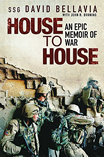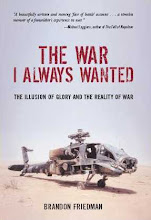The response to my article in The Washington Post (I'm Still Tortured by What I Saw in Iraq) has been overwhelmingly supportive. Of hundreds of emails, only a few have been negative. Check out the below response from a reader. I think it sums up how my message of 'no torture' has been received across the country:
As someone who has a Master's Degree in Organizational and Social Psychology (even though I teach English!), I have often said "We, as humans -- as thinking, clever and conscience-laden social animals- MUST have devised a better alternative to torture, and to war, than what our current Neanderthal strategies would show."
Your article proved me right.
I asked my husband to read it aloud in our living room Sunday morning. (I know, it's hard to be both a teacher and a mom-- for my kids and husband that is!) In attendance were my three teenage boys (19, 17 and 13). Especially notable is that my 19 year old is a third year cadet at the Virginia Military Institute (ROTC- Marine Corps). His roommate from California was with us for Thanksgiving; also 19, a third year cadet and ROTC Marine Corps. Like many idealistic young men of their age, they are patriotic, but naive, with what I call a "video-game" mentality of serving their country. It's very "bad guy vs. good guy"; black and white kind of thinking -- although to VMI's credit as a liberal arts college, I've been impressed with the classes I've personally witnessed that show another view to life.
Your excellent article pointed out that there is much wisdom, and solid success, in using our brains; and in living in the shades of gray (not falling prey to stereotypical thinking).
My husband is a 30 veteran federal investigator from NYC -- he's dealt with his share of outlaws, and does have his stories of informants he befriended for the good of the investigation, rather than hammered them (metaphorically speaking, of course).
Final confession: I liked your article so much I am including it as part of my students' English final exam next week. They will read and annotate it, and then discuss the various ways your ethos, logos and pathos combine to form a persuasive argument, using Aristotle's criteria.
Thank you again for your insight, and for your courage in speaking out. I hope you have received supportive messages from those of us who see that patriotism does not just include a blind allegiance to policies that are a moral insult to the values of this country.
Sincerely,
Caron
skip to main |
skip to sidebar

At one point the reward was $25 million, but Coalition Forces dropped it to $10 million.

Air Force F-16s dropped the bombs.



June 7th, 2006

The news of Zarqawi's death was celebrated across Iraq (courtesy AP Images).

Carried out by Zarqawi's associate, this bombing incited the civil war between Sunni and Shia (courtesy AP Images).

The Egyptian, he was Zarqawi's right hand man and is now the leader of Al Qaida in Iraq.

Zarqawi's Spiritual Advisor.

Zarqawi delivering a sermon. This was the last video of him before his death.

Unable to reload his weapon.

Major General Caldwell informing the press of Zarqawi's death.

April 2003, just short of "mission accomplished."
By Matthew Alexander
Interview with Paul Harris on KTRS
"The things that make you a good American are the same things that make you a good interrogator."
-- Matthew Alexander
-- Matthew Alexander
World War II Interrogators
Contact the Author
I'll take your questions at:
howtobreakaterrorist@
gmail.com
I'll post responses here on the blog.
howtobreakaterrorist@
gmail.com
I'll post responses here on the blog.
How to Break a Terrorist was co-authored by John R. Bruning with a Preface by Mark Bowden, author of Black Hawk Down and Killing Pablo.
Order from:
Reward Poster

At one point the reward was $25 million, but Coalition Forces dropped it to $10 million.
The Airstrike

Air Force F-16s dropped the bombs.


Deceased Zarqawi

June 7th, 2006
Iraqi Soldiers Celebrating.

The news of Zarqawi's death was celebrated across Iraq (courtesy AP Images).
The Golden Dome Mosque

Carried out by Zarqawi's associate, this bombing incited the civil war between Sunni and Shia (courtesy AP Images).
Abu Ayyub al Masri

The Egyptian, he was Zarqawi's right hand man and is now the leader of Al Qaida in Iraq.
Sheikh Abu Abd' al Rahman

Zarqawi's Spiritual Advisor.
Preacher of Hate

Zarqawi delivering a sermon. This was the last video of him before his death.
Zarqawi

Unable to reload his weapon.
Press Release

Major General Caldwell informing the press of Zarqawi's death.
Baghdad International Airport

April 2003, just short of "mission accomplished."
Recommended Reading
Click on the book images below to read about these books.
About the Authors
- Matthew Alexander
- Matthew Alexander has served for over eighteen years in the U.S. Air Force and Air Force Reserves. As the leader of an elite interrogations team in Iraq, he conducted or supervised more than 1,300 interrogations. He is a veteran of three wars and was awarded the Bronze Star Medal in 2006 for his achievements in Iraq, including leading the interrogations that led to the killing of Abu Musab Al Zarqawi, the notorious Al Qaeda leader.




